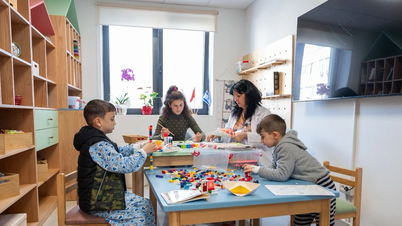In order to ensure no one is left behind after exam season, it is time for parents and teachers to take a deeper look into the silent sadness, how adults accompany, and how to help students maintain faith in the future.
Accompanying after the exam
After the exam scores are announced, social networks often appear with anxious and even desperate status lines: “I tried my best, but I still wasn’t good enough”, “My parents will be very disappointed”… Many students choose to stay silent, withdraw into themselves, not daring to leave their rooms, not wanting to interact with anyone.
Others fell into a state of anxiety, insomnia, and some cried in the middle of the night because they felt like “a burden to their family.” These are no longer “normal” reactions after exams, but rather alarming signs of mental trauma.
Perhaps the thing that hurts most students is not the low score, but the feeling of being judged, left behind, and compared. Careless comments from adults such as “Why is it so bad?”, “What can you do with that kind of studying?”, “Other people have such high scores…” easily dig into the already shaky psychology after the exam. Many psychologists call it “post-score crisis” - a phenomenon that is becoming more and more common, but has not received the proper attention from families and schools.
Teachers cannot change the score of an exam, but they can change the way students perceive and move through it. After receiving their scores, the first thing students need from their teachers is not the question “How did you score?”, but a non-judgmental look, a listening question: “How do you feel?”. Students may not be ready to say it right away, but the teacher’s calm and sincere presence is a silent affirmation: “I am here for you, no matter what your score is.”
Many schools still unintentionally create more pressure by posting scoreboards, naming top students, or sending results reports to parents too early. Meanwhile, the “post-exam” period is when students are very fragile and vulnerable if compared, and easily despair if they feel “inferior to others”.
Teachers, more than anyone else, can be the bridge to help students realize that an exam is not their whole life. Poor results do not mean failure. Tell students that on the journey to adulthood, there are interesting turns, and that success does not come from the transcript, but from determination and perseverance. Teachers, especially homeroom teachers - who understand students' psychology quite well, should explain in a way that helps students understand that "when the exam is over, the scores remain... and so does the sadness".
Teach them how to stand up, not just walk on flat roads. And sometimes, a small gesture from teachers is enough to give them the courage to start again more calmly and gently.
What about parents? Sometimes they don't know that just a frown, a shake of the head or a careless remark can make their children feel like failures. Meanwhile, the psychology of eighteen-year-olds is easily shaken. They have just gone through a stressful exam, and are burdened with the pressure of the whole family's expectations, but the results are not as expected, that feeling can easily turn into guilt, shame, and even despair.
A student once wrote in his diary: "It's not because of the low score that I'm sad, but because of my mother's eyes after seeing my score."
Therefore, parents do not need to say flowery words, nor do they need to immediately outline a plan to “start over”. What children need most is a quiet space - a place where they are safe, loved, not questioned or compared. A hug, a simple sentence like “It’s okay, your parents always believe in you” can become a support for children to overcome the first incident in life, regain the courage to continue on their own journey.
In particular, parents need to avoid turning scores into “family honor”. Because if love is conditioned by achievements, then when children do not meet expectations, parents themselves have unintentionally made their children feel that they are no longer worthy of love. And parents - the ones who understand their children's personalities best - need to become their children's companions during this difficult period.
Parents need to remember that children need their parents as support, not as judges. After all, what remains is not the scores - but how adults loved their children when they faced failure.

There are many beautiful dreams ahead
Dear students! If today you are feeling sad because of a number, please allow me to say: You are not a walking test. Life does not grade you on a scale of 10, nor is it classified by a report card. You are students full of emotions, with the ability to reach far, and your test score is just a small part of that long journey.
Look out that window - where there are people working in carpentry, mechanics, art, sports, agriculture ... who still live well and happily without ever going to university. Look back at yourself, when you have overcome many difficulties, tried tirelessly, stayed up late, encouraged your friends... can that be denied just because of grades?
You are all different, and you don’t all reach the finish line at the same time. Some go fast, some go slow, some find their path early, some have to try many times. But as long as you don’t give up, no one will “slip” out of this life. Don’t forget that failure doesn’t mean you’re “inferior,” it just means you’re learning a lesson more important than any exam: a lesson about determination, perseverance, and starting over stronger.
In that moment of seemingly failure, you really grow up. And sometimes, the way you stand up after your first stumble in life will be the best "score", making you take your hat off for the rest of your life. Your maturity is also shown through the way you behave with your family, teachers, and friends during this sensitive period. Instead of withdrawing or being angry with the world , take the initiative to share, listen, and ask for advice.
The world of tomorrow needs many types of successful people - not just those who score high on exams, but also those who know how to love, create, correct mistakes and start over. If today is a sad day, don't be afraid because after that sad day, the sun will still rise. Give yourself a chance to rest, cry, be a little weak. But then get up gently and move on. Because out there, you still have many things to dream of. And each of those dreams, no matter how big or small, deserves to start today.
Source: https://giaoducthoidai.vn/dong-hanh-cung-thi-sinh-dung-day-nhe-nhang-va-buoc-tiep-post739945.html





![[Photo] National Assembly Chairman Tran Thanh Man attends the VinFuture 2025 Award Ceremony](/_next/image?url=https%3A%2F%2Fvphoto.vietnam.vn%2Fthumb%2F1200x675%2Fvietnam%2Fresource%2FIMAGE%2F2025%2F12%2F05%2F1764951162416_2628509768338816493-6995-jpg.webp&w=3840&q=75)
![[Photo] 60th Anniversary of the Founding of the Vietnam Association of Photographic Artists](/_next/image?url=https%3A%2F%2Fvphoto.vietnam.vn%2Fthumb%2F1200x675%2Fvietnam%2Fresource%2FIMAGE%2F2025%2F12%2F05%2F1764935864512_a1-bnd-0841-9740-jpg.webp&w=3840&q=75)







































































































Comment (0)